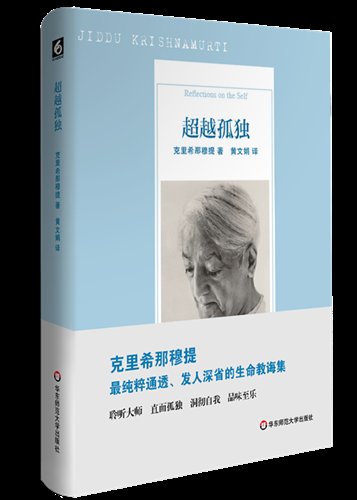Krishnamurti’s ideas resonate with Chinese readers

Book cover of the Chinese version of Reflections on the Self Photo: Courtesy of East China Normal University Press
In contemporary China, where schools are anxious to cram knowledge into students' brains and prepare them for endless exams, the teachings of renowned Indian philosopher Jiddu Krishnamurti (1895-1986) seem particularly relevant. A collection of Krishnamurti's writings and sayings, Reflections on the Self, has just been translated into Chinese and published by East China Normal University Press.
On January 19, a lecture titled "Unconditioning through Education" delivered by Jaap Sluijter, the executive director of Krishnamurti Foundation of America, was held at East China Normal University, during which Sluijter shared with Chinese readers his opinions on the book and his understanding of Krishnamurti's essential teachings.
Krishnamurti was born in 1895 in Madanapalle in southern India. When he was 14, his father worked for the Theosophical Society, where he met Charles Leadbeater, an English theosophist, occultist and self-proclaimed clairvoyant. Leadbeater was convinced that Krishnamurti was destined to be a great spiritual leader. Over the next decade, the Theosophical Society took over Krishnamurti's life and education, sending him to Europe and California to prepare him for his future role as "World Teacher."
As he grew older, Krishnamurti began to reject the path imposed on him by the theosophists and eventually made it clear that he didn't belong to any established belief system or organization. In 1929, he dissolved the Order of the Star, an organization that had been established to support him as a world spiritual leader. He spent the rest of his life traveling the world, speaking to large and small groups and individuals. As he said in his book, what he was really concerned about was how to give humankind absolute freedom.
More than one-third of Krishnamurti's teachings are about education. In his ideal vision, school is a place to transform human consciousness and a place of leisure, where students have time and space to ponder who they really are and find out what they really love to do. The purpose of the educational process is to cultivate students' minds not only intellectually, but also emotionally. "Our education now is like producing robots. Students spend six to eight hours per day learning. Their weekends are filled up with homework. Society believes that for a kid to have more knowledge and skills are good. So children's time is occupied by things. But Krishnamurti says the human mind needs space to learn about itself and space to simply be," Sluijter explained.
Krishnamurti said that one has to be willing to stand alone and face the fear of not being able to make a living. But today's society judges a person by whether he or she is successful and ambitious. "Success and achievements mean that you live for the future and you have goals, but is your self built on these goals and on opinions from your friends and family? Man must understand what he is made of. Through this understanding he can change his behavior and transform his mind," Sluijter said.